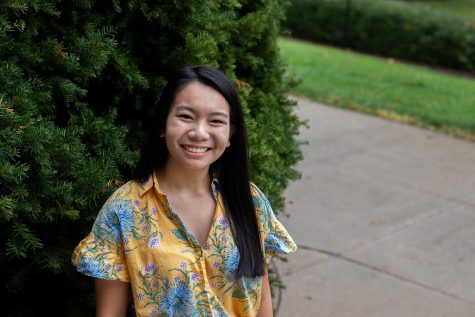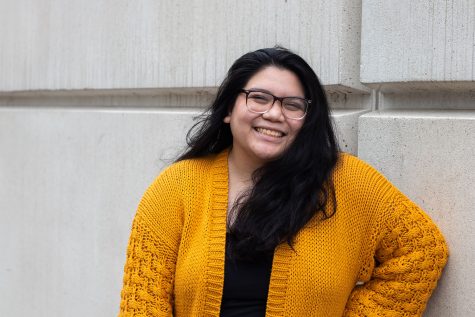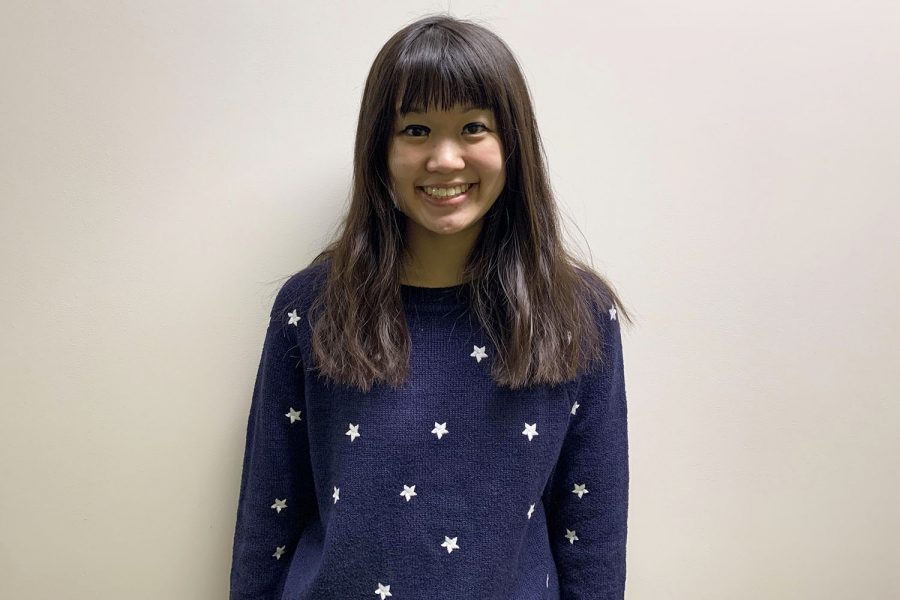First-hand experiences of Asian American racism in the age of COVID-19
Three Asian American students share their stories about facing Anti-Asian discrimination and how it has impacted their lives.
My name is Hannah Maree Eun Pinski. My middle name is shortened from Eunme — the Korean name I was given before I was adopted from South Korea at four months old. At age nine when I was attending middle school in Wheaton, IL, I was told by a former friend it wasn’t pretty because it sounded weird. Then, the person pulled her eyes and said, “I guess it makes sense since you have ugly eyes.” Everyone around me joined in her laughter, and I was left crying in a bathroom stall.
Since that day, I have avoided answering the question of my middle name or have left out the “Eun” until now. I still have yet to feel like I am beautiful.
Asian American racism and stereotyping in America is an issue that needs to be addressed in American culture and media. The model-minority myth and fox-eye trend that non-Asians are using – a makeup technique to make the eyes look slanted – are tangible examples of racism and cultural appropriation. What gets glossed over is the everyday experiences Asian Americans face and have become normalized. The racist comments to microaggressions impact our lives in a hurtful way that the majority of people don’t realize. Now, in the middle of a pandemic, racism has taken a form of scapegoating that has escalated oppression against the Asian American population.
During the COVID-19 pandemic, racism has taken new forms. When language used to describe the pandemic such as “Chinese virus” and “kung flu” is used, it associates blame on Asian Americans. President Donald Trump has constantly used these terms in his tweets and blamed the Chinese community on multiple occasions. Since the outbreak of coronavirus, a June Pew Research survey found 58 percent of Asian American adults say they have seen more people expressing racist or racially insensitive views of Asian Americans.
Between March and August, more than 2,583 anti-Asian American hate incidents ranging from harassment to physical assault were reported to the Asian Pacific Policy and Planning Council.
Rachel Li, a sophomore majoring in medical anthropology and music, has faced some of these incidents while being on the University of Iowa campus.

When the U.S. began reporting its first COVID-19 cases in February, Li attended a comedy event hosted at the Iowa Memorial Union where an individual in the audience stood up and made a COVID-19 joke pointed toward Asian Americans.
“I was one of maybe three Asians there,” Li said. “The host called him out, and I ended up approaching him to stand up for myself. He ended up leaving after he was confronted by both me and the host.”
This semester, Li was walking on the UI campus surrounded by white students when a maskless woman put her hand up to her face when she approached Li and immediately dropped it as soon as she passed her.
The racist language used to describe the pandemic has depicted Asian Americans as a virus rather than individuals and have become a scapegoat for the ongoing pandemic.
We feel anxious out in public because Asian Americans have been tied to the reason for a canceled graduation ceremony or a postponed spring-break trip and have become a target for people’s anger at COVID-19 mitigation measures.
Caitlyn Valencia, a Filipino third-year and first-generation student studying violin performance and music education, is frustrated with the effects of the racist language that is being used to describe the virus.
“I don’t feel welcome here, and it’s not right because America is supposed to be built off of diversity,” Valencia said. “It’s sad that now privilege includes being looked at as a person instead of a scapegoat. Nowadays being Asian also means being viewed as a target for blame.

“I grew up in a majority-white suburb. I faced bullying through racist remarks because I was different. The incident that happened to me when I was nine was just the beginning. People knew where to twist the knife as I got older with phrases, ‘Go back to where you came from’ and ‘Ch*nk — your opinion doesn’t matter.’”
What people don’t understand is that racism doesn’t just tear down self-esteem. It’s the fact that your value and worth is somehow less because your race makes you different, which people use to justify oppression and mistreatment. I would stare at the mirror and hate what I saw because my ethnicity had somehow deemed me unworthy of the same degree of human respect as everyone else.
The part of me I was told to embrace by my family had become something that I was ashamed of, and it got to the point where I was crying because I was wishing for something that I knew I could never change.
Valencia had her world turned upside down when she moved in fifth grade from a diverse Filipino community to a white suburb.
“Kids would bully me all the time because I didn’t look like them,” Valencia said. “I was called ‘China’ in middle school and people pulled the corners of their eyes on the school bus. As it continued growing up, I developed anxiety and depression. I didn’t realize how much this affected me until I mentally broke.”
However, it’s not just the blatant racist comments that myself and others have faced that are harmful. It’s also the questions I get that are underlined with ignorance like, “What are you” or “Are you North or South Korean?”
Li faced these similar types of microaggressions when she moved from Singapore to West Des Moines five years ago.
“When I went to registration freshman year, the school assumed I couldn’t speak English and wanted to put me in the ESL program,” Li said. “People also assumed I was Chinese and asked me if I ate dogs and if I lived in a village.”
These microaggressions and jokes are disrespectful and make us feel dehumanized. But when we speak out and condemn this behavior, we often are told the slight was just a joke or that we are too sensitive.
“Looking back at high school, the microaggressions got to a point where we encouraged people to joke about us because every teenager wants to be liked and to fit in,” Valencia said. “Calling out people pushes them away.”
The experiences that Rachel, Caitlyn, and I share are only a fraction of the struggles and oppression that Asian Americans are facing every day.
I can’t change what I’ve gone through and the feelings of invalidation and unworthiness will never completely go away. The only thing I’m able to do is open up and hope that it’ll encourage empathy and conversation in order to promote change in behavior and attitude.
Everyone needs to start speaking up about this behavior and learn from their mistakes instead of justifying them. I don’t want my children to grow up and face experiences like I have that make them feel their ethnicity is something they should be ashamed of.
It’s not right that Anti-Asian American discrimination is normalized, and we have become scapegoats. The behaviors need to be called out, the jokes need to stop, and the microaggressions need to be filtered. The Asian American population has endured this mistreatment for too long, and it’s time to de-normalize it so we can be treated as equals.



